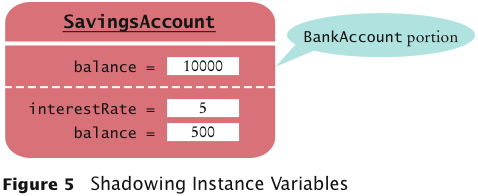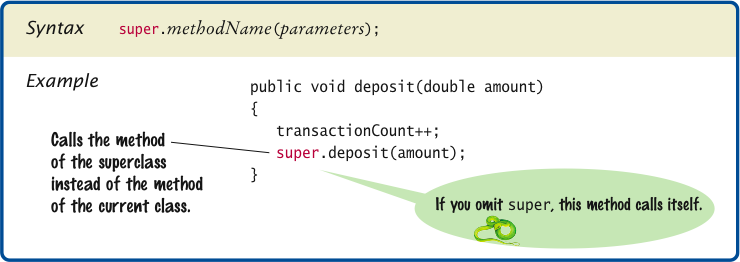





Should we place the addInterest method in the BankAccount class?
SavingsAccount subclass has an addInterest
method.public class SavingsAccount extends BankAccount
{
added instance variables
new methods
}
SavingsAccount collegeFund = new SavingsAccount(10); // Savings account with 10% interest collegeFund.deposit(500); // OK to use BankAccount method with SavingsAccount object
public class SavingsAccount extends BankAccount
{
private double interestRate;
public SavingsAccount(double rate)
{
Constructor implementation
}
public void addInterest()
{
Method implementation
}
}

public class SavingsAccount extends BankAccount
{
private double interestRate;
public SavingsAccount(double rate)
{
interestRate = rate;
}
public void addInterest()
{
double interest = getBalance() * interestRate / 100;
deposit(interest);
}
}

Which instance variables does an object of class SavingsAccount have?
interestRateinterestRate and balanceinterestRate, balance, and
interest
Which methods that you can apply to SavingsAccount objects?
deposit and withdraw, but not
addInterestdeposit and withdraw, but not
getBalanceaddInterest but not deposit,
withdraw, or getBalancepublic class SavingsAccount extends BankAccount
{
public void addInterest()
{
double interest = getBalance() * interestRate / 100;
balance = balance + interest; // Error
}
. . .
}
solvethis problem by adding another instance variable with same name:
public class SavingsAccount extends BankAccount
{
private double balance; // Don’t
. . .
public void addInterest()
{
double interest = getBalance() * interestRate / 100;
balance = balance + interest; // Compiles but doesn’t update the correct balance
}
}

public class BankAccount
{
. . .
public void deposit(double amount) { . . . }
public void withdraw(double amount) { . . . }
public double getBalance() { . . . }
}
public class CheckingAccount extends BankAccount
{
. . .
public void deposit(double amount) { . . . }
public void withdraw(double amount) { . . . }
public void deductFees() { . . . }
}
public class CheckingAccount extends BankAccount
{
. . .
public void deposit(double amount)
{
transactionCount++;
// Now add amount to balance
balance = balance + amount; // Error
}
}
public class CheckingAccount extends BankAccount
{
public void deposit(double amount)
{
transactionCount++;
// Now add amount to balance
deposit(amount); // Not complete
}
. . .
}
deposit(amount);
as
this.deposit(amount);
which calls the method we are currently writing ⇒ infinite recursion
public class CheckingAccount extends BankAccount
{
public void deposit(double amount)
{
transactionCount++;
// Now add amount to balance
super.deposit(amount);
}
. . .
}
public class CheckingAccount extends BankAccount
{
private static final int FREE_TRANSACTIONS = 3;
private static final double TRANSACTION_FEE = 2.0;
private int transactionCount;
. . .
public void withdraw(double amount)
{
transactionCount++;
// Now subtract amount from balance
super.withdraw(amount);
}
public void deductFees()
{
if (transactionCount > FREE_TRANSACTIONS)
{
double fees = TRANSACTION_FEE * (transactionCount - FREE_TRANSACTIONS);
super.withdraw(fees);
}
transactionCount = 0;
}
. . .
}
